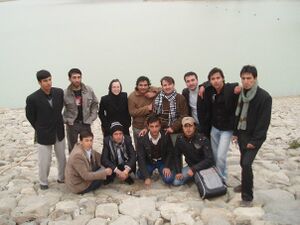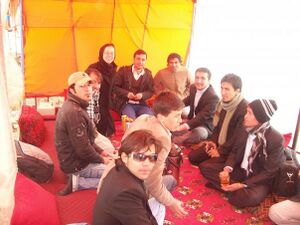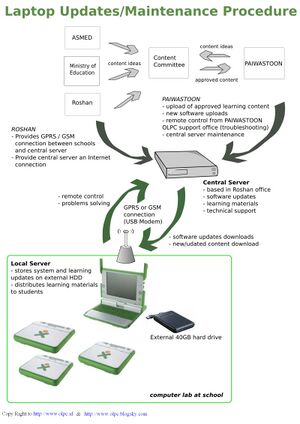OLPC Afghanistan: Difference between revisions
| Line 102: | Line 102: | ||
[http://wiki.laptop.org/go/OLPC_Afghanistan/Deployment_News Read here] |
[http://wiki.laptop.org/go/OLPC_Afghanistan/Deployment_News Read here] |
||
==Implementation Plan== |
|||
Here is the list of schools in 5 provinces of Afghanistan. OLPC Laptops will be deployed to all Kabul schools and 25 selected schools in other provinces. Here is the list of schools for pre-selection: |
|||
*[http://wiki.laptop.org/go/Imp_Kabul <b>Kabul</b>] |
|||
*[http://wiki.laptop.org/go/Imp_Baghlan <b>Baghlan</b>] |
|||
*[http://wiki.laptop.org/go/Imp_Balkh <b>Balkh</b>] |
|||
*[http://wiki.laptop.org/go/Imp_Herat <b>Herat</b>] |
|||
*[http://wiki.laptop.org/go/Imp_Nengarhar <b>Nengarhar</b>] |
|||
==The Structure of Technical Operations== |
==The Structure of Technical Operations== |
||
Revision as of 16:44, 23 July 2009
One Laptop Per Child AfghanistanThis is the new Official Wiki page for "One Laptop Per Child Afghanistan" project. The old page is archived at [One Laptop Per Child Afghanistan]. Project GoalsAfghanistan is a very famous for being a multicultural country. Participation of the OLPC project in Afghanistan will not only revolutionize the way children are taught, but also scale up the eco-system of sharing between the diverse set of communities existing in the central Asian countries. The mission of this Nonprofit Organization is to create an environment for OLPC, take necessary steps to ensure every child in Afghanistan gets the laptop and develop the Local Activities for OLPC laptops that could revolutionize how Afghani children are educated. The goal is to provide every child in Afghanistan with new opportunities to explore, experiment, and express themselves in a collaborative way. The Ministry of Education Afghanistan (MoE), and Ministry of Communication and Information Technology Afghanistan (MoCIT), in a unique public-private partnership with USAID’s Afghanistan Small and Medium Enterprise Development (ASMED) and Telecom Development Company Afghanistan - Roshan, launched the One Laptop Per Child (OLPC) project in Afghanistan in September 13, 2008. Contacts and Further Information• Official OLPC Afghanistan website • Official OLPC Afghanistan Dari Weblog • Contact Salim Hayran, OLPC Afghanistan Project Coordinator • Send inquiries to info@olpc.af StakeholdersThe following stakeholders are working together to improve education and bring new opportunities for economic development through low cost computing and computer literacy for the Afghanistan's future workforce. • Members of Ministry of Education Afghanistan • Members of Ministry of Communications and IT Afghanistan • USAID's Afghan Small and Medium Enterprise Development (ASMED) • Roshan: one of the largest private employers in Afghanistan • PAIWASTOON Networking Services Ltd: PAIWASTOON is Afghan-International company with a focus on developing sustainable solutions that Make IT Work For Afghanistan. We specialize in open source technology, localization and online applications. We seek opportunities for technology to have a positive effect on as many Afghans as possible, as sustainability as possible. We build the capacity of our local team towards the aim of creating a sustainable locally led company. For further information, contact the implementation team. Collaboration by the StakeholdersLocalization of XO's into Afghan languages (Dari & Pashto) has been successfully completed, Pashto translation is completed both in pootle online translation server as well as our Entrans translation server, Dari translation was completed offline and then uploaded to pootle server and the translation over Entrans was also successfully completed. In order to load localized interface into XOs, MoE in cooperation with ACSA verified (approved) the translation of Pashto localization and now we are waiting for the approval of Dari localization. The Pashto Verified / adjusted files were compiled and uploaded to the XO machines before the deployment in Jalalabad, where now it’s being used in XO laptops. On May 31st, 2009, a collaborative effort was made between OLPC Afghanistan, Master Teachers by Satellite for Afghanistan (MSTA) and Afghan Film to develop an educational game for the XO laptops deployed in Afghanistan. Stories of Nasruddin will guide children through the game. The game will focus mainly on literacy (Dari, Pashto) and numeracy; in later stages science subjects such as physics, biology and chemistry will be added. OLPC Afghanistan expects that the game will be developed in next 2-3 months. DeploymentsTeam Members InvolvedVolunteer Team Read More about the OLPC Afghanistan volunteers [here OLPC Afghanistan Team Read about the OLPC Afghanistan Team here Join the FaceBook group for fresh and updated news as well. Pilot ProgramOLPC technical implementation team started working on 19th of November 2008. In December 2008 OLPC Afghanistan deployment team received 10 XO's from the Ministry of Education Afghanistan, for a test lab, which was based in PAIWASTOON office. These XO's are used for experiments and testing in OLPC-AF Office by its technical team, in order to develop and test new activities and software for XO's. First DeploymentTwenty teachers have been trained in this school and now they are teaching students with XOs. The Master trainers were trained in PAIWASTOON office and they trained the teachers in the school. In January, 2009, teacher training took place in Kabul and Jalalabad. Each was four days long. The deployment should have started in the last week of January, but it actually happened in mid-March. On March 17th, 2009 a ceremony took place at the governor's palace including the Deputy Minister of Education Afghanistan, Director of ICT for the Ministry of Education Afghanistan, Director general of ICT for Ministry of Communication and IT Afghanistan, parents, children (top class position holders e.g. "honor roll"), USAID/ASMED's regional manager and the OLPC Afghanistan Technical Implementation Team. In its first deployment plan, OLPC-AF provided 396 XOs to every single child in a school in grades 4, 5 & 6 at the Istiqlal High School in the Ningarhar province of Jalalabad. Once the remaining number of XOs are received from OLPC, they will be deployed to grades 1-3. The Istiqlal parents’ attitude, community acceptance, and the school’s overall attitude toward OLPC were the major factors for selection. Also the school size and the number of students in that school was the best match for our first pilot school. The deployed laptops are pre-installed with: * Complete localization of all core activities in both national languages of Afghanistan (Dari and Pashto) * The Ministry of Education standard national curriculum books * Economic information for parents including advice on job interviews etc, a local business directory, a guide to starting a business in Afghanistan, and research of different possibilities for starting small businesses locally. * Health information (Basic Hygiene, Nutrition, Hand washing - some remaining to be translated) * Localized updated manuals / guides that replace the standard user manual and appear when the user clicks the Help Icon * Information for parents about the XO laptop and it's benefits Roshan Telecom provided Internet connectivity (64 kbps) to the school, and now students are connected through the mesh network as well as low-speed (just for upgrading of sugar/activities) Internet connection. Children were of course delighted to receive the laptops and quickly started exploring. The Technical Implementation Team is following up the pilot school to see how the kids and their teachers are getting on with OLPC XO laptops. Second DeploymentOLPC entered its second phase of deployment on June 21st, when students in grades 4-6 in four Kabul schools were given 2000 laptops. Upcoming updates of this deployment will be coming soon. Deployment Wiki Page
The Structure of Technical OperationsThe first diagram shows the structure of Technical operations of OLPC Afghanistan. The Second one is the chart of Laptop Update and Maintenance procedure and the job of each team member. The third diagram is showing an example of networking sites available for teachers in schools. Sections: The whole Technical operations can be divided into 5 sections.
This section's responsibility is deployment of OLPC laptops to schools with all related logistics and actions.
Technical trainers are responsible for education of teachers and at the beginning of the project also for education of Technical operations staff.
User service teams provides support for teachers and schools what OLPC laptops concern – troubleshooting, documentation creation, development of new activities (programs). This team will closely cooperate with Ministry of Education on development of new content and activities for OLPC already deployed where MoE will provide the Curricular specifications and content and User service team developers will create the programming part.
Localization team is responsible for translating the current activities into Dari and Pashto. This activity will take place at the very beginning of OPLC project. Job descriptions of each positionFollowing are concrete job descriptions of each position within Technical operations.
Main responsibilities:
__________________________________________
Main responsibilities:
__________________________________________
Main responsibilities:
__________________________________________
Main responsibilities:
___________________________________________
Main responsibilities:
____________________________________________
Main responsibilities:
____________________________________________
Main responsibilities:
____________________________________________
Main responsibilities:
____________________________________________
Main responsibilities:
____________________________________________
Main responsibilities:
____________________________________________
Main responsibilities:
____________________________________________
Main responsibilities:
External links
This category is only for pages that describe an OLPC deployment. Category:Deployment planning is for pages about the topic of deployments. See the Deployments page for deployment summary information pulled from these pages. Template:Deployment puts pages in this category. Deployment coordinators can use Has default form::Form:Deployment to edit these pages; look for an 'edit with form' tab on them. Afghanistan |







